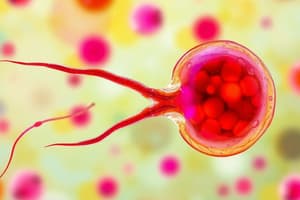Podcast
Questions and Answers
What is a primary ethical concern surrounding the use of gene editing technologies in reproductive medicine?
What is a primary ethical concern surrounding the use of gene editing technologies in reproductive medicine?
- The high cost of the procedures, making them inaccessible to most people.
- The lack of regulation and oversight in the application of these technologies.
- The potential for unintended consequences and off-target effects on future generations. (correct)
- The risk of exacerbating existing health conditions in the individuals undergoing treatment.
Which of the following is a significant limitation of radiation therapy in cancer treatment?
Which of the following is a significant limitation of radiation therapy in cancer treatment?
- The limited availability of radiation therapy centers in rural areas.
- The high cost associated with the advanced technology and specialized facilities required.
- The development of resistance to radiation by cancer cells over time. (correct)
- Its inability to target specific cancer cells, leading to widespread damage.
What is a key advantage of using Preimplantation Genetic Diagnosis (PGD) in conjunction with In Vitro Fertilization (IVF)?
What is a key advantage of using Preimplantation Genetic Diagnosis (PGD) in conjunction with In Vitro Fertilization (IVF)?
- It eliminates the need for multiple IVF cycles, reducing the overall cost and time investment.
- It guarantees a successful pregnancy by ensuring the transfer of only genetically healthy embryos.
- It allows for the selection of embryos free from specific genetic disorders, reducing the risk of passing them on to offspring. (correct)
- It increases the overall success rate of IVF by improving embryo implantation rates.
What is a primary environmental concern related to the widespread use of insecticides in malaria control programs?
What is a primary environmental concern related to the widespread use of insecticides in malaria control programs?
Which factor poses a significant social challenge in accessing advanced reproductive technologies like IVF and PGD?
Which factor poses a significant social challenge in accessing advanced reproductive technologies like IVF and PGD?
Flashcards
In Vitro Fertilization (IVF)
In Vitro Fertilization (IVF)
An assisted reproductive technology where fertilization occurs outside the body.
Preimplantation Genetic Diagnosis (PGD)
Preimplantation Genetic Diagnosis (PGD)
Genetic profiling of embryos prior to implantation, used to identify genetic defects.
Malaria
Malaria
A mosquito-borne infectious disease affecting humans and animals, caused by parasites.
Radiation Therapy
Radiation Therapy
Signup and view all the flashcards
Chemotherapy
Chemotherapy
Signup and view all the flashcards
Study Notes
- Biotechnology assists individuals facing reproductive challenges through various methods.
In Vitro Fertilization (IVF)
- IVF is an assisted reproductive technology (ART).
- It helps with conception by fertilizing an egg outside the body.
Preimplantation Genetic Diagnosis (PGD)
- PGD is a genetic profiling technique.
- It is used on embryos before implantation.
Gene Editing
- Gene editing raises questions about its ethical implications and potential impacts.
Malaria
- Malaria is an infectious disease transmitted by mosquitoes.
- It affects both humans and animals.
Radiation Therapy
- It is a cancer treatment that uses targeted radiation.
- It damages the DNA of cancer cells to stop their growth.
Chemotherapy
- Chemotherapy is used in cancer treatment.
Advantages of Biotechnology in Reproductive Issues
- Helps couples who are unable to conceive naturally.
- Can screen embryos for genetic diseases before implantation.
- Allows single people or same-sex couples to have children.
Disadvantages of Biotechnology in Reproductive Issues
- IVF is expensive and not always successful.
- PGD raises ethical concerns about selecting certain embryos.
- Gene editing has potential risks and long-term consequences that are not fully understood.
Limitations of Biotechnology in Reproductive Issues
- IVF success rates vary depending on age and other factors.
- PGD can only screen for certain genetic diseases.
- Gene editing is still in its early stages of development and is not widely available.
Benefits of Biotechnology in Reproductive Issues
- Reduces the risk of passing on genetic diseases to children.
- Increases the chances of successful pregnancy for some couples.
- Offers new options for people who want to have children.
Economic Factors
- IVF and other ART treatments are expensive, which can make them inaccessible to some people.
- The cost of genetic testing and gene editing can also be a barrier to access.
Social Factors
- There is a stigma associated with infertility in some cultures.
- Some people have moral or religious objections to ART treatments.
Ethical Factors
- PGD raises ethical concerns about selecting certain embryos.
- Gene editing raises concerns about unintended consequences and the potential for misuse.
Environmental Factors
- The production of hormones used in IVF can have environmental impacts.
Studying That Suits You
Use AI to generate personalized quizzes and flashcards to suit your learning preferences.
Description
Explore biotechnology's impact on reproductive challenges through IVF and PGD. Learn about gene editing ethics, malaria, and cancer treatments like radiation and chemotherapy. Discover how biotech helps couples conceive and prevent genetic diseases.




